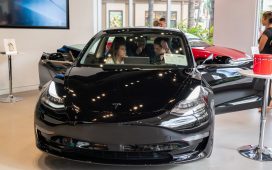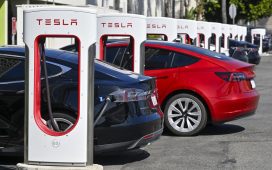Patrick Pleul | picture alliance | Getty Images
Carbon dioxide emissions from plug-in hybrid electric vehicles are more than two-and-a-half-times greater than official test levels, new research claims.
Published this week, the analysis — conducted by the Transport & Environment campaign group and supported by environmental organization Greenpeace U.K. — stated that, on average, “typical” plug-in hybrid electric vehicles, or PHEVs, emit around 117g of CO2 per kilometer. This figure is considerably higher than the 44g of CO2 per kilometer that official test results have shown, the briefing said.
To put this data into context, the paper said that over its lifetime, a new PHEV would emit around 28 tonnes of CO2, compared to a petrol car’s 39 tonnes and a diesel car’s 41 tonnes.
“Investigations also show PHEVs often switch on their engine even when driving with supposedly zero emissions,” the paper said, adding that it was clear that “PHEV emissions are much more comparable to those of conventional cars than electric cars.”
Transport & Environment said it had collated data from “a wide range of sources” that represented roughly 20,000 PHEVs in both private and fleet use.
The data comes as the U.K. government analyzes feedback from a consultation on stopping the sale of new hybrid, diesel and gasoline cars and vans by the year 2035 or sooner. According to Transport & Environment, PHEVs could be exempt from the ban.
“Plug-in hybrids are the car industry’s wolf in sheep’s clothing,” Rebecca Newsom, who is head of politics at Greenpeace U.K., said in a statement issued Wednesday.
“They may seem a much more environmentally friendly choice but false claims of lower emissions are a ploy by car manufacturers to go on producing SUVs and petrol and diesel engines,” Newsom added.
Plug-in hybrid electric vehicles, or PHEVs, are cars which have an internal combustion engine as well as a battery-powered electric motor.
Some regard them as an important tool in the transition toward low- and zero-emission forms of transport. Back in July, Håkan Samuelsson, the chief executive of Volvo Cars, described the vehicles as a “very popular concept” and “bridge technology.”
The chief executive of the Society of Motor Manufacturers and Traders, Mike Hawes, described the report from Transport & Environment as “flawed,” adding that it relied on figures from a testing regime that was no longer in use.
“However, even the report’s assumed figures show plug-in hybrid vehicles provide more than a 30% overall reduction in emissions compared to petrol or diesel,” he said.
“PHEVs also provide a flexibility few other technologies can yet match with extended range for longer, out of town journeys, and battery power in urban areas, reducing emissions and improving city air quality.”
Hawes went on to state that PHEVs would continue to improve both in terms of their range and performance, “meaning that, for many users, they are the essential stepping stone to a fully electric vehicle.”








